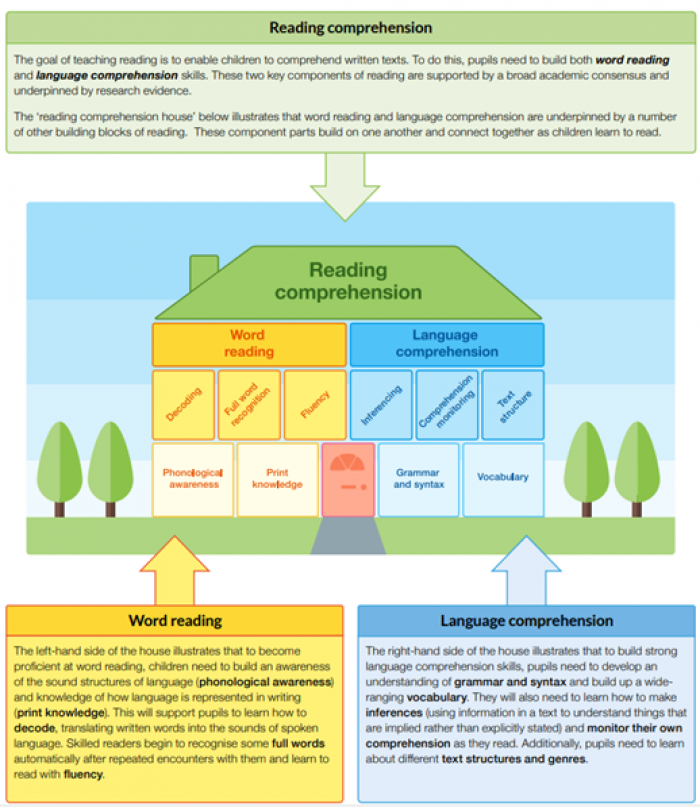Welcome to Year 2 2023-2024.I hope you have all enjoyed your May half term! Only 7 weeks until our summer holidays!
Here is some information you may find useful which is updated every half... more

English Leader: Miss Harvey
Reading:
'Teachers read a wide range of highquality books to pupils. They encourage pupils to explore new authors and to read regularly. A love of reading is promoted through use of the school libraries and reading initiatives.' Ofsted 2023
See separate phonics page for information about our phonics delivery across the school. Daily guided reading sessions take place throughout EYFS to Year 6 using high quality texts, focusing on many different question types, which relate to the reading content domains. The content domain sets out the relevant elements from the National Curriculum programme of study. In EYFS early reading skills will be taught alongside some basic comprehension. In KS1 to KS2 a sequence of lessons will be taught building on a specific content domain each week. Additionally, a ‘treasure chest’ activity will be planned focusing on a range of content domains. Comprehension activities take place in various contexts across the curriculum.
Reading for Pleasure
We have many opportunities to encourage children to read for pleasure;
Please see the attached questions to use when reading with your child for EYFS, KS1 and KS2. Additionally, for top tips for reading with your child at home, refer to: 10 top tips for parents to support children to read - GOV.UK (www.gov.uk)
Writing:
The teaching of Spelling, Punctuation and Grammar, is a strong element which runs throughout the whole of the English Curriculum. Year group teaching expectations are very specific and are taught as both discrete sessions as well as explored through reading and writing activities. Please see attached Spelling, punctuation and grammar overview. At Broadbent Fold we use Talk4Writing across our curriculum. https://www.talk4writing.com/ This enables our pupils to remember what they have read and transfer this into writing. Each year group has a half termly whole class text which they use to base lots of their English and wider curriculum area work through. Please see the attached English LTP showing the texts that used across the school. Opportunities are planned for consolidating the features of previous genres taught into wider curriculum work. For instance if Year 1 look at writng labels in Autumn 1, then in a later term they will consolidate this by writing labels in other areas of the curriculum.
For spelling we use a mixture of First Class Phonics and Jane Considine's strategies, which supports our children spelling in all their pieces of writing. These schemes focus on statutory spelling patterns and common exception words for Y1-6. In order to enhance our pupil's knowledge of vocabulary, we also use Vocabulary Ninja to develop vocabulary in specific subjects and also through our word of the day activities. Children will experience writing in a variety of fiction, non-fiction and poetry genres. This is evident across school in planning, books and on displays. Regular writing opportunities across a range of subjects are used to develop and extend skills. Please see attached statutory spelling lists.
Handwriting
At Broadbent Fold we work hard to ensure that children have the ability to produce fluent, legible joined up handwriting. We teach and practise the skills from nursery when we focus on pencil grip and letter formation through to Year 6 where we finesse our skills.
Username- jk5800 Password- home
Interventions
Any child who is beginning to fall behind, is quickly identified and supported. To address gaps in reading fluency and comprehension at KS2, our skilled practitioners use repeated reading and domain based questioning to explore a range of texts for wider reading and to extend vocabulary. Support staff are well trained in delivering interventions. These include; Toe by Toe, BRP, Write Away. Precision Teaching and dyslexia screening.
Assessment
We assess reading using the National Curriculum for each year group, daily guided reading, children's reading books and NFER end of term assessments. Teachers assess writing after each unit and we use our own moderation documents to check on standards. We work closely with a cluster of schools to quality assure our decisions and we support each other on driving standards further.